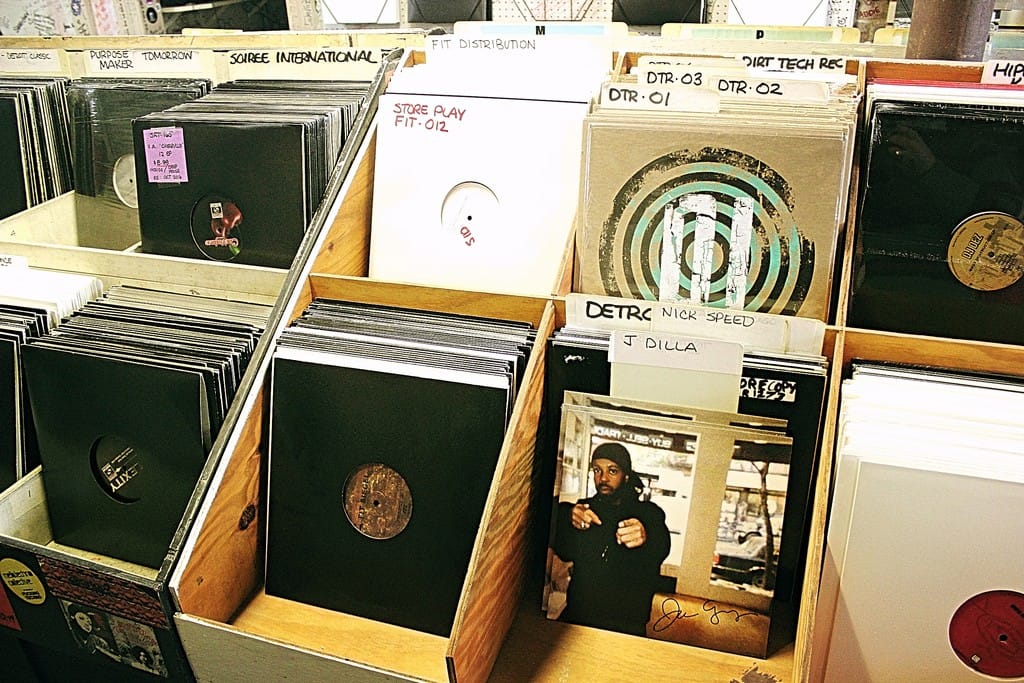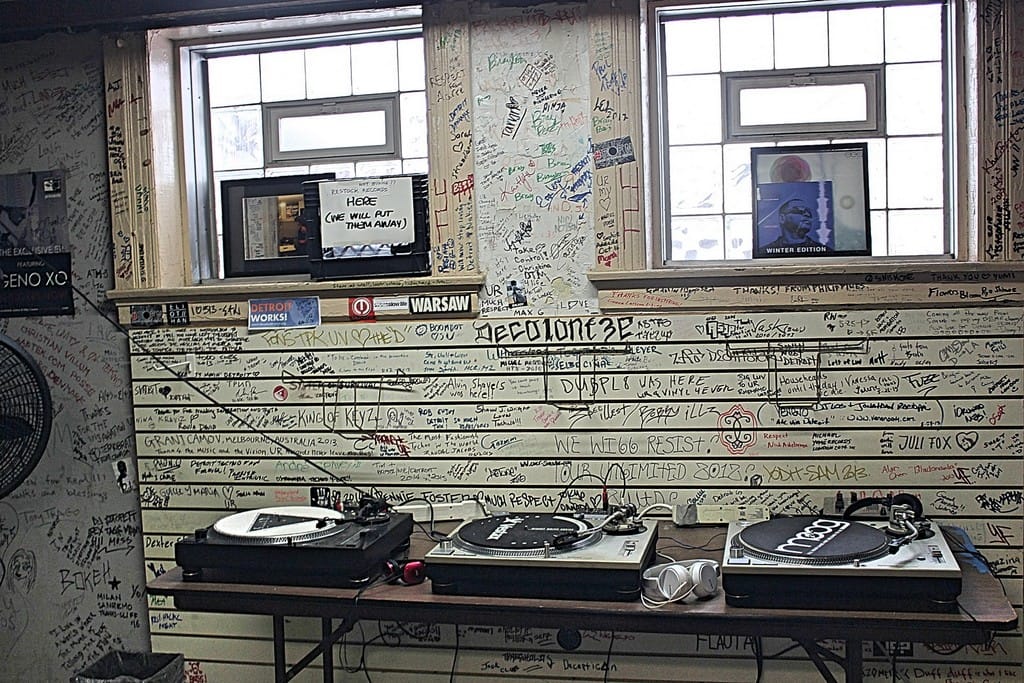
I love Detroit. This city is loaded with great stories, many of which are oft hidden, unacknowledged, or underreported. If not inscribed for the future, when these stories are gone, they’re gone forever, like magnificent old buildings. To me, these stories are priceless.
The building at 3000 East Grand Boulevard is sign-less and unassuming. It sits near the Jam Handy warehouse on Detroit’s Eastside, within view of the stately 30-story tall Fisher Building.
This humble 3-story brick building was built in 1910 and is 8,790-square feet. It houses a significant contribution to Detroit’s cultural history, something vital and irreplaceable, a collective of Detroit techno culture.
Exhibit 3000, the world’s first (and only) techno museum is housed here on the main floor.
In the basement is the legendary Submerge’s Somewhere In Detroit (SID) record store and then upstairs is the HQ of Underground Resistance (UR). There are also recording studios, rehearsal spaces and offices.
Downstairs, DJ John Collins and Tyler Dancer are prepping the museum for a school tour today. Collins has been a well-known DJ since 1985. He’s a producer, manager, and talent agent. Tyler is a young DJ and producer from Kalamazoo who now lives in Detroit. Techno great Mad Mike Banks is also here getting things squared away. The ethic is: everyone helps out regardless of status.
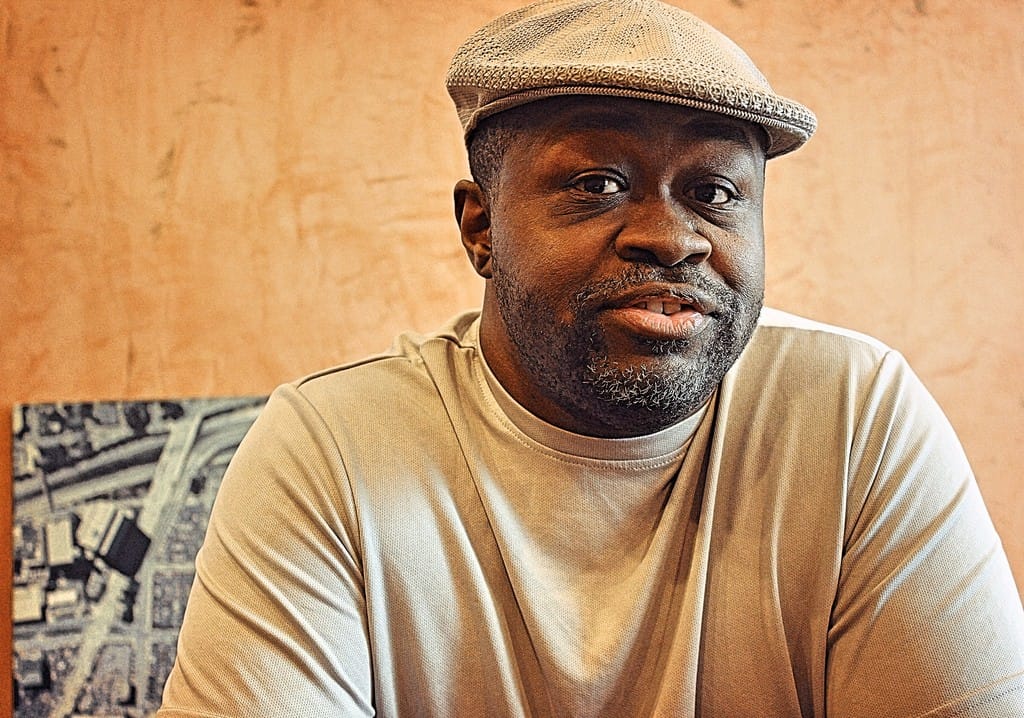
I’m sitting upstairs in a conference room with Detroit’s own Cornelius Harris, who was (and still is?) the only black manager in techno music in the world. “That’s what I’ve been told. I’m not aware of any other black managers in techno, in the world,” he says.
Cornelius Harris is the label manager of Detroit-based independent techno label Underground Resistance, an assistant at Submerge Distribution (and SID), and founder of Alter Ego Management.
Cornelius is a deep thinker with a multitude of insights and very focused on all aspects of the intersection of culture and music. We are discussing books, vinyl records, the roots of techno and all-things Detroit.
Cornelius explains:
“History, especially local history, is important to know so you understand the context of where you’re at in the world and in your own time. The impact of certain points in history have a lingering echo long after the fact.”
“I’m originally from Ann Arbor. Moved to Detroit in the 90’s. I’m not here by accident. I love the people, the culture, the history, the music.”
“I consider myself a cultural advocate and activist, promoting agents of culture beyond mere entertainment and using it as a tool for education and inspiration. I studied Media and Pop Culture at University of Michigan. My family are all educators and very passionate.”
“Economically, how do you bring this thing that came out of Detroit and generates millions of dollars globally, back to the source? I’m always interested in the next stage of evolution. Detroit is a powerful music center. How do you drive culture in the city?”
Detroit: The Birth of Techno
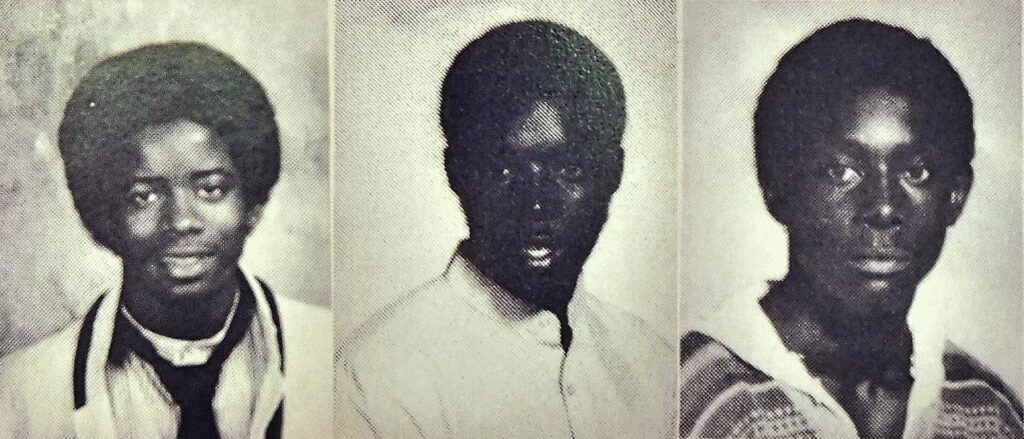
“Techno music was started in the early 1980s by four African Americans: Juan Atkins, Kevin Saunderson, Derrick May and Eddie Fowlkes. The first three went to Belleville High School and Eddie went to a different school.”
“At the time, it wasn’t called ‘techno’, it was just a new, emergent form of different music. The British press came up with the title ‘Belleville Three’ even though they DJed mostly in the city of Detroit. Belleville isn’t known for its cutting-edge club scene.”
“Just like any inception-story, there’s different mythologies about this. One is the facts. The others are the added interpretations, which become the agreed upon history. So, let’s just agree to a middle understanding of all this.”
“They were playing a precursor to techno before their music was given a label by outsiders. What they had created was inner city dance music with a futuristic vibe.”
“In the mid to late 80’s, techno blew up here locally in Detroit. It was already a phenomenon here for several years before it became popular globally.”

“All of the techno labels were based in Detroit’s Eastern Market neighborhood.”
The first one was in 1985 when Juan Atkins opened Metroplex (1492 Riopelle St), then in 1986 Derrick May opened Transmat (1492 Gratiot), then in 1987 Kevin Saunderson opened KMS next door to Transmat.”
“Derrick started referring to Gratiot Avenue as ‘Techno Boulevard’.”
“These were the days of things like Channel 62 ‘The Scene’ and the Electrifying Mojo on Detroit’s WGPR, which was the first black radio station in America.”
“We also had Duane ‘In the Mix’ Bradley on WJLB Radio.”
“We had Jeff Mills, DJ Stacy “Hotwaxx” Hale, and there was Ken Collier who played house music at Club Heaven (19106 Woodward @ 7 mile).”
“There was The Music Institute (1315 Broadway an after-hours techno club opened from 1988-89).”
“Across the river in Windsor, there was Richie Hawtin (Plastikman) who was inspired by Detroit techno. By the early 90’s, everybody was getting turned on to Detroit music all over the world.”

“Music popularity goes in waves. Techno got big globally around 1991, then experienced another resurgence in the late 90’s-early 2000’s, and a few years ago we had another wave.”
“Also, we had the techno festival, which started in Detroit in 2000 and was called DEMF before it became Movement in 2006.”
“Detroit is the smallest big town ever. Among creatives here of all stripes, mostly everyone knows everyone. Some of Juan Atkins old tapes even feature Kid Rock back when he had spiky hair and was trying to rap.”
“I credit Creem Magazine with symbolizing the Detroit ethos. Not being on the East or West Coasts, we weren’t bound by those scenes. There’s no restrictions here, we’re free to do our own thing, which Creem reflected in its coverage of music. “
Underground Resistance (UR) Detroit
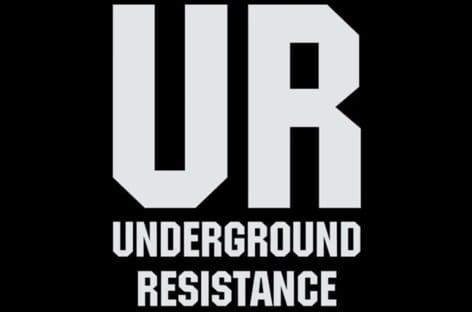
“Underground Resistance, aka: UR, is a collective, that’s the best word to describe it because there’s so much back and forth flow between the various groups and producers.”
“UR was started in 1989 by Jeff Mills and Mad Mike Banks in Mike’s mom’s basement on Detroit’s Westside near 7 Mile and Livernois. Mike and Jeff worked together before in a group called Members of the House. Mike had at one time been in a band on tour alongside Parliament Funkadelic.”
“The UR album UR001 had Yolanda Reynolds on it. She was the original third member of UR. A lot of people think of Robert Hood as the third member of UR, but he came later, though a lot of people forget that.”
“In 1991, the city of Berlin, Germany was hit by UR’s music from Detroit not long after the Berlin Wall came down. Detroit’s techno music helped unite the young people of East and West Berlin and reenergize the city. It was the soundtrack of what was happening in Berlin. And there were tons of Detroit techno records at the Hard Wax store owned by Mark Ernestus.”
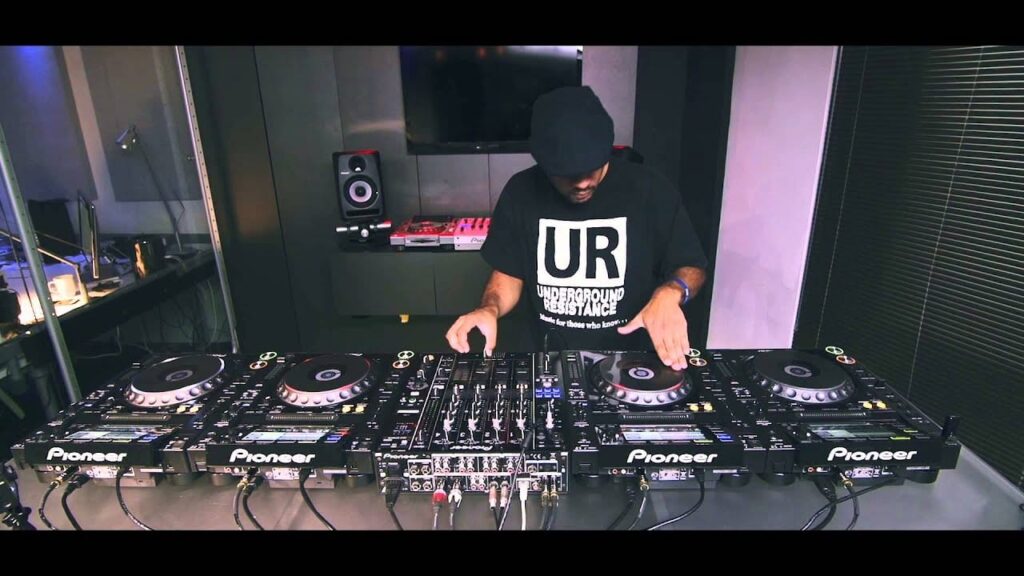
“I joined UR in the mid 1990s. The Detroit Regional Music Conference, started by DJ John Collins, was going on and I was a producer at the time. I submitted to perform at the conference. The music showcase manager said I should give my tape to Mike Banks, which is how we met. I also had put together a zine called SCENE. Mike and Lawrence Burden asked me to work with them doing promotion. Mike later asked about me doing label management. I did it until 2001 when I became extremely burned-out.”
“I quit everything for a bit and became anti-music for a few years. Did some management at Kinney Shoe Corp (Foot Locker), then Kinko’s, also did some teaching at a middle school. Eventually, I created Alter Ego Management and started again fresh. Alter Ego used to rep Juan Atkins, Model 500 and others. Right now we handle UR and some others.”
“At the time just before starting Alter Ego I, got a call from Mike. He said they’re working on a project in Japan. He invited me to come work on it, and initially I said, “no,” but he said ‘they got those thinking gardens in Japan, you could just come here and think’ (laughs). I was in the middle of acting in a show with Plowshares Theater. Mike was insistent. So I went to Japan. I was there for six hours and decided to return as label manager in 2005.”
“My first time as a tour manager, through the Burden Brothers (Lenny & Lawrence), was a tour in Germany. I was tour manager for Aux 88 who was on their label Direct Beat.”
“I remember being in Berlin outside this club talking to a local dude, told him he should come check out the scene in Detroit. He said, ‘I’ll never go to Detroit. I don’t make enough money to travel, but when I go to this club and it’s dark, and a Detroit DJ is playing, I can imagine that I’m in a Detroit club. That’s how I’m able to travel’. His explanation really stuck with me.”
“I realized that we’re giving people, people who are willingly giving their hard-earned money to us, these one-of-a-kind experiences. We owe everything to these people who make that choice to support the music. It really had a profound effect on me, gave me a sense of purpose.”
“For some people, music is their main outlet. It’s a type of therapy, a release for them, something they can’t get any other way. We all owe a deep appreciation for the fans who live on this stuff.”
“The clubs are social spaces where amazing things can happen. The 1980’s were rough in Detroit. The U.S. was in a bad recession, there was crack, AIDS, Detroit was dubbed ‘Murder Capital of the World’, the auto industry went to hell, etc. The one good thing at the time coming out of Detroit globally was this music, techno.”
“These aren’t just DJ’s, they’re cultural ambassadors. They are some of the best representations this country has ever had, often better than professional diplomats. They tour extensively and as a result, acquire a broad perspective and deep understanding of other cultures and people around the world.”
“Jeff Mills currently lives in Miami, France and Japan. In 2017, Jeff got the Order of Arts and Letters in France, which is that country’s second highest title, for his cultural contributions. Other nations seem to recognize the importance of creativity. The city of Detroit, our state, our nation, should consider providing more recognition to their own people. Why do we gotta go to France to get awards and be recognized? Why can’t it happen right here where it all started and continues to thrive? It would uplift the community in a positive way.”
“Detroit’s global contributions are numerous. Back here at home, true community development is not just giving money to something and hoping for the best. Things need to be nurtured, cared for, and given the proper attention in order to develop.”
Submerge Distribution

“Submerge Distribution was founded in 1992 by Mike Banks and Christa Robinson.”
“It was originally located Downtown at 2030 East Grand River Ave. However, in 2000, we moved to 3000 East Grand Blvd.”
“Submerge exports Detroit techno labels to Europe and the world and transmits Detroit’s techno music around the world. All the techno and house labels went through Submerge.”
“There is no ‘Submerge Records’, it’s a distributor and vinyl record store. We carry all kinds of records but primarily specialize in techno, house and hip hop. Heavily Detroit oriented. There’s also Basic Channel out of Berlin.”
“Submerge even put out J. Dilla’s first vinyl record in 1994.”
“Everybody who visits the Submerge basement signs the wall.”
The Impact of Books on Cornelius
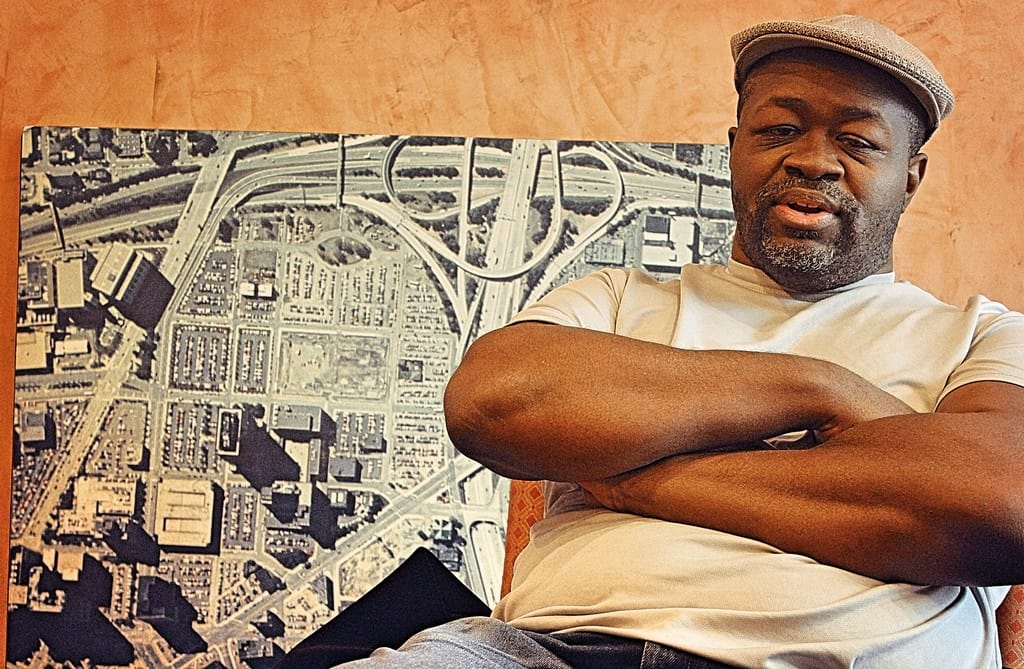
“I love to read. Books are powerfully influential across all cultures, professions, whatever. Books are windows into the unfamiliar. Having a broad interest in a lot of different things gave me the perspective I have today.”
“Prior to music, I worked in the reference department at the downtown Ann Arbor Library from 9th grade through my time at the University of Michigan. First shelving books, then at the desk as an assistant. I grew up surrounded by books. A lot of my interpretation of the world was formed by books and music.”
“Here’s a few of the key books that have inspired me over the years.”
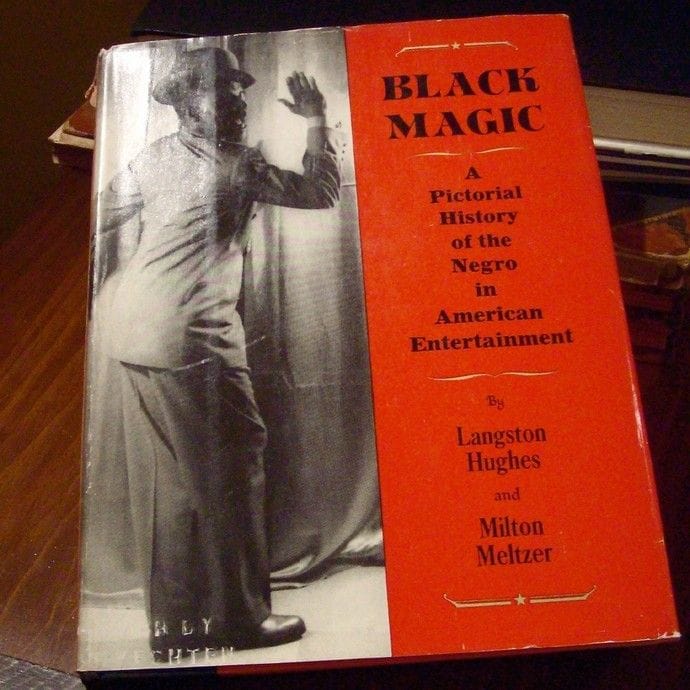
“Black Magic (1967) Langston Hughes. Chronicles black entertainment from slavery to the modern late 60’s. Amazing as a kid growing up with that book. It traces the painful lineage of exploitation as well as incredible achievements.”
“Sex and Race (1940-44) J.A. Rodgers (3 vols.) I first read it at the public library when I was 10 or 11. Originally was excited by the name (laughs). Turned out to be a fascinating study of racial classifications, how people mix and blend and the fact that definitions of race are subjective.”
“Dustland (1980) Virginia Hamilton. It’s part of The Justice Trilogy about an African American girl named Justice. First time I ever read sci-fi where the central characters were African American. It blew my mind.”
“No-No Boy (1956) John Okada. The first Japanese American novel. It takes place just after WW2, it’s about Japanese no-no boys and post-war trauma in the USA.”
“Los Arboles Mueren de Pie (1949) Alejandro Casona. Amazing book, written in Spanish. I recommend learning Spanish just to read this book. It’s about how you define family. Magical realism. Many intriguing twists and turns.”
“Mumbo Jumbo (1972) Ishmael Reed. Magical realism about historical events and a contagious epidemic of the Jes Grew virus.”
“New Teen Titans: The Judas Contract (1988) Wolfman and Perez (DC Comics, Titan). They took this medium and crafted a story so thoughtful, warped, exciting. It’s about betrayal and abuse.”
Some Favorite Records & Why Vinyl Still Matters
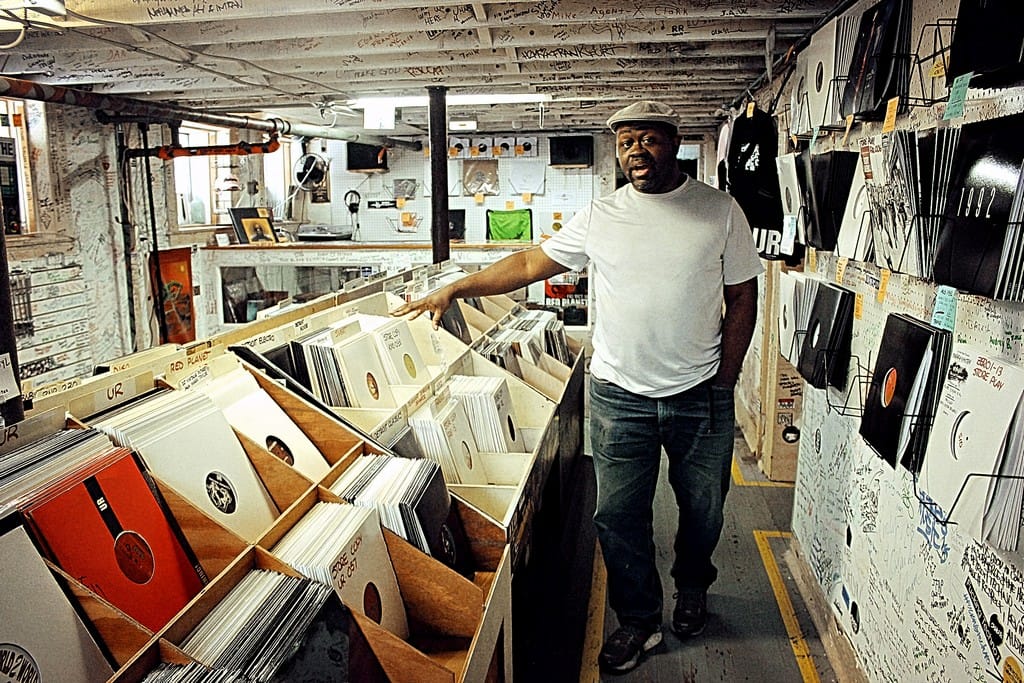
“Musically, I listen to a range of different things. Grew up on jazz and gospel. My grandma from the had grown up in the South and turned me onto Hank Williams.”
“Some influential albums for me are:”
Prince-Dirty Mind (1980)
Jorge Ben-Samba Esquema Novo (1963)
Grace Jones-Nightclubbing (1981)
Ryuichi Sakamoto-Merry Christmas, Mr. Lawrence (1983)
“Vinyl records still matter, still sell, still elevate the listener. There’s something special and different with something being tangible, rather than bits of information on a computer. To feel the grooves with your fingers. It’s an experience, you feel more connected. With vinyl you have to put the needle on it, make sure the needle is clean, flip it over when it’s done, you interact with it differently than you do a playlist on your smartphone.”
“Also, the order of the tracks meant something, not just random shuffling. Tracks are not just thrown onto an album indiscriminately. There’s a meaning in the order.”

The Need to Preserve Creative Spaces in Detroit

“Detroit needs more creative spaces. The value of the creative community to a city cannot be overstated. Creative people imbue spaces with value. And they almost always need help from the city to mitigate things like gentrification and help maintain safe and fun spaces & outlets, for other people to go and experience the gift of their creativity. There should be a low barrier to entry.”
“People have had their life changed forever by music or art. Creativity keeps people in neighborhoods and stabilizes communities. Make it easy for people to access these things.”
“Right now, Detroit is a place where the creative community can go in any direction. As a city, we need to recognize talent and creativity and help engage creative types. Yet some of our greatest spaces are being ignored and disregarded. Detroit is loaded with iconic spots that should be preserved and used instead of being wasted unnecessarily. How do you set things up for success?”
“Listen, I’ve traveled all over the world for the past almost thirty years and I can honestly tell you that Detroit is a global nexus of untapped, undiscovered potential. It’s here but it’s disguised because it’s not often officially recognized by big-time funding.”
“We have the spaces, we’re just not doing anything with them, not making them accessible, and it’s a tragedy that’s rarely discussed. These places will get torn down and most folks, especially young folks, won’t ever even know they were there in the first place. We need to preserve them and do everything we can to drive more creative people to the city.”
“The world is saturated with creativity in all forms from Detroit. I remember when I was in Japan, a promoter told me at the time he couldn’t book one of my DJs because Japan had too many people from Detroit there! (laughs) That’s how big and powerful our footprint as a creative class of people is globally.”
“We’re givers not takers. We give the world our creativity, but I don’t think we take enough a lot of times and it shows because it seems there’s always a financial struggle here for everyone. Culture comes from the incredible wonderful, people here. The people are the value. They should be embraced.”
Thoughts on The Future

“I don’t worry about the future of techno. It will evolve. Musical, creative diversity has to be encouraged. Stuff that doesn’t exist currently will be born and become transformational. Music is a reflection of that generation, that time, what’s happening globally and locally.”
“There is an undeniable need for space and a need to encourage openness. Hopefully Detroit will continue being at the forefront like it always has been. Don’t be afraid of the future. Yes, things will be strange and different than what you’re used to right now, and that’s a good thing.”
“Just remember, Motown was started by high school kids singing in their garages. They were broke but they were passionate and creative. However, what really changed everything was love from the local community. The community was supportive and encouraging. Local support helped them thrive globally. Never forget the enduring and positive lesson of Motown.”
Bonus: Cornelius’ favorite eateries in the Metro Detroit area
Pupuseria y Restaurante Salvadoreno (3149 Livernois, Detroit)
Yum Village (6500 Woodward, Detroit)
Royal Kabob (3236 Caniff, Hamtramck)
KG’s Grill (465 Inkster rd, Garden City)
Al Ameer’s (27346 Ford Rd, Dearborn Heights)

UR, Submerge & Exhibit 3000 Museum
3000 East Grand Blvd.
Detroit, MI 48202
Exhibit 3000 Museum
For free tours or if you want to donate early techno artifacts
Contact:
John Collins
Cornelius Harris
UR
http://www.undergroundresistance.com/
UR FB
https://www.facebook.com/URundergroundresistance/
Somewhere in Detroit (Submerge)
https://www.facebook.com/Somewhere-in-Detroit-242400282479827/
Alter Ego Management
